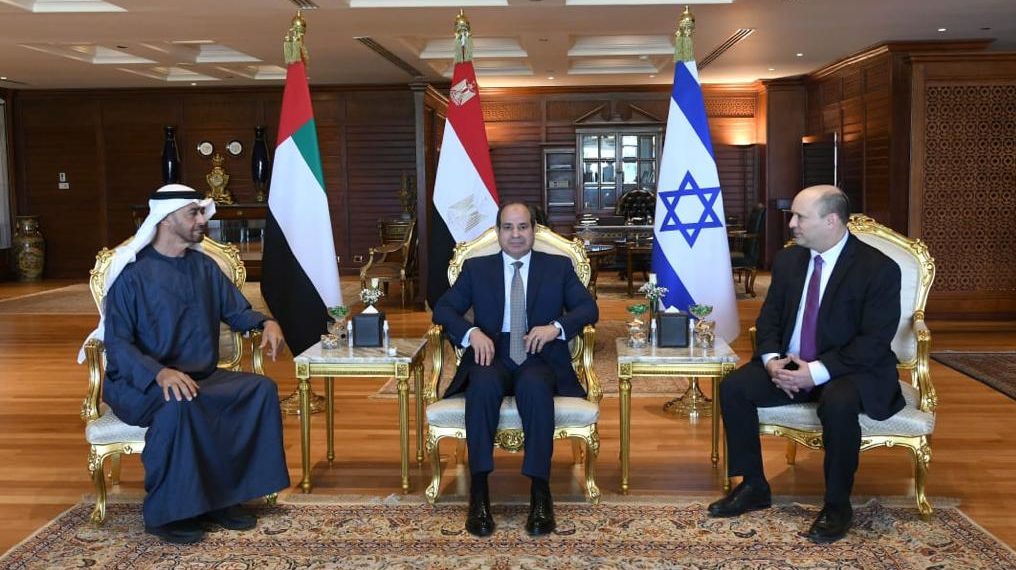Leaders of Egypt, Israel, UAE Meet in Sinai Amid World, Regional Developments
Unprecedented and unexpected summit may signal emergence of new regional cooperation model
[Cairo] In a surprise visit to Sharm el-Sheikh on Monday, Israel’s Prime Minister Naftali Bennett and Abu Dhabi Crown Prince Mohamed bin Zayed Al Nahyan, the de facto leader of the United Arab Emirates, held a tripartite summit with Egyptian President Abdel Fattah el-Sisi.
“The meeting discussed the repercussions of global developments, especially with regard to energy, market stability and food security,” according to Sisi’s spokesman. The men also “exchanged visions and views on the latest developments of several international and regional issues,” the statement said.
The meeting on Monday marks Bennett’s second visit to Egypt since assuming office. His first official visit to Egypt took place in September.
“Against the backdrop of the recent developments in the world and the region, the leaders discussed the ties between the three countries and ways to strengthen them on all levels,” the statement added.
Abdel-Moneim Said, a senator in Egypt’s Shura Council, chairman of the board and CEO of Al-Masry Al-Youm Publishing House in Cairo, and head of the Egyptian Center for Strategic Studies (ECSS) advisory board, told The Media Line: “We are facing a new regionalism – a reorganizing of regional powers – which is evident in President Sisi’s visits to Saudi Arabia, the UAE and Kuwait. These are intense meetings, all of which have to do with the Iranian deal, in light of current negotiations on the nuclear agreement, and how this issue is being dealt with by different regional actors.”
Against the backdrop of the recent developments in the world and the region, the leaders discussed the ties between the three countries and ways to strengthen them on all levels
The crown prince, known as MBZ, tweeted on Monday that “I met with my brother President Abdel Fattah el-Sisi in Sharm el-Sheikh today, where we discussed ways to further boost our deep ties and areas of continued cooperation to benefit our two nations. Our talks also covered the latest international developments.”
Said points out that some Arab countries in the region have reached out to Iran. “Saudi Arabia and the UAE have opened channels of communication with the Iranians. Including Egypt in these communications expands the regional framework for consultation. In my opinion this is still in the exploratory stage. As far as I know, we have not yet set a clear agenda that accommodates non-Arab countries in the region,” he said.
“It is within this context that I see the current meetings,” Said added. “Some of them are bilateral matters related to UAE investments in Egypt. It is also certain that security discussions with Israel are proceeding in a normal manner. It is also certain that the Egyptian-Israeli relationship has recently strengthened with a fixed flight path between Egypt and Israel, as well as a great openness to Israeli tourism. There is a kind of warmth.”
Bennett pointed to the agreement signed last week establishing direct flights between Sharm el-Sheikh and Tel Aviv as a positive development.
“This agreement will further warm the relations between Israel and Egypt. The cooperation between our two countries is expanding in many fields, and this is contributing to both peoples and to regional stability. Israel is opening up to the countries of the region and the basis for this long-standing recognition is the peace between Israel and Egypt. Therefore, on both sides we need to invest in strengthening this connection – and that’s what we are doing,” he said last Wednesday.
Said points to the Arab Gas Pipeline project, a pipeline built to carry natural gas from Egypt to Jordan, Syria and Lebanon with branch underwater and overland pipelines to and from Israel, as part of the new regional restructuring and notes that “it includes a role for Israel.”
He explains that: “As part of that restructuring, Egypt has become a gas hub, and uses it in economic or commercial operations, whether by liquefying it for export or passing through the Arab Gas Pipeline. This is part of the future that Egypt draws for itself as a hub for energy in general and for gas in particular, within the framework of the East Mediterranean Gas Forum,” an international organization formed by Cyprus, Egypt, France, Greece, Israel, Italy, Jordan and Palestine.
The two best forces in diplomacy in our region are Israel and the United Arab Emirates
Bennett’s visit to Egypt this week also aims to help ease tension between the UAE, the United States and Egypt against the backdrop of the Russian war on Ukraine.
US sanctions on Russia have led to additional economic hardship for Egypt.
“The two best forces in diplomacy in our region are Israel and the United Arab Emirates. And they were the ones who were defending Egypt after the coup of July 3 [2013] and saying that the US sanctions are a kind of madness,” Walid Darwish, a professor of political economics based in Brussels, told The Media Line
“We know that we are on the cusp of economic difficulty. Today, Egypt is giving the Israelis things they have been asking for for a while, including putting an umbrella on the Emirati-Israeli relations, which are under severe pressure from public opinion. In return, Israel will use its tools in America to put pressure on the American administration,” Darwish added.
“It’s a win-win situation in a volatile global atmosphere in terms of security and economy, and one of the losers is Egypt. This is in addition to the continuous pressure from America and Western Europe,” Darwish said.
“I think the moment has come to use the Israeli lobby card in America to assist Egypt and the UAE,” Darwish concluded.


